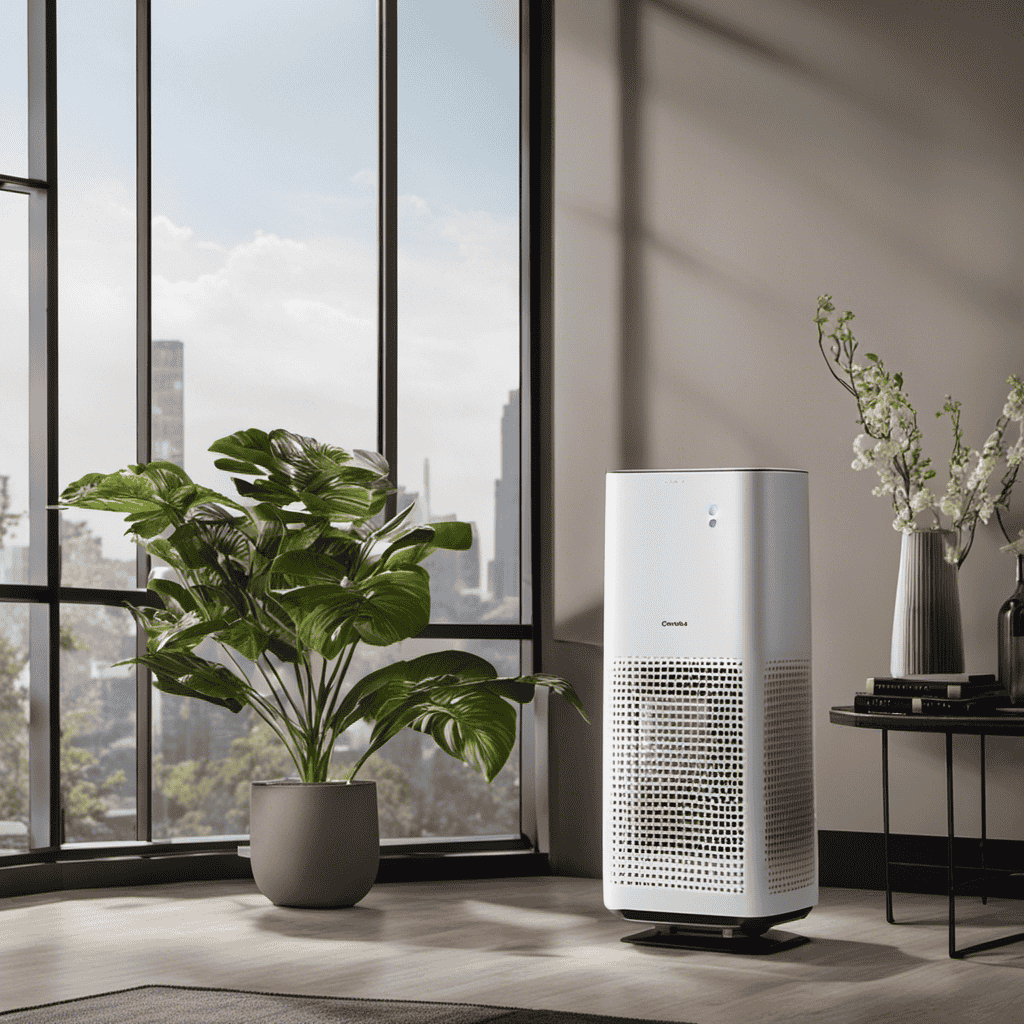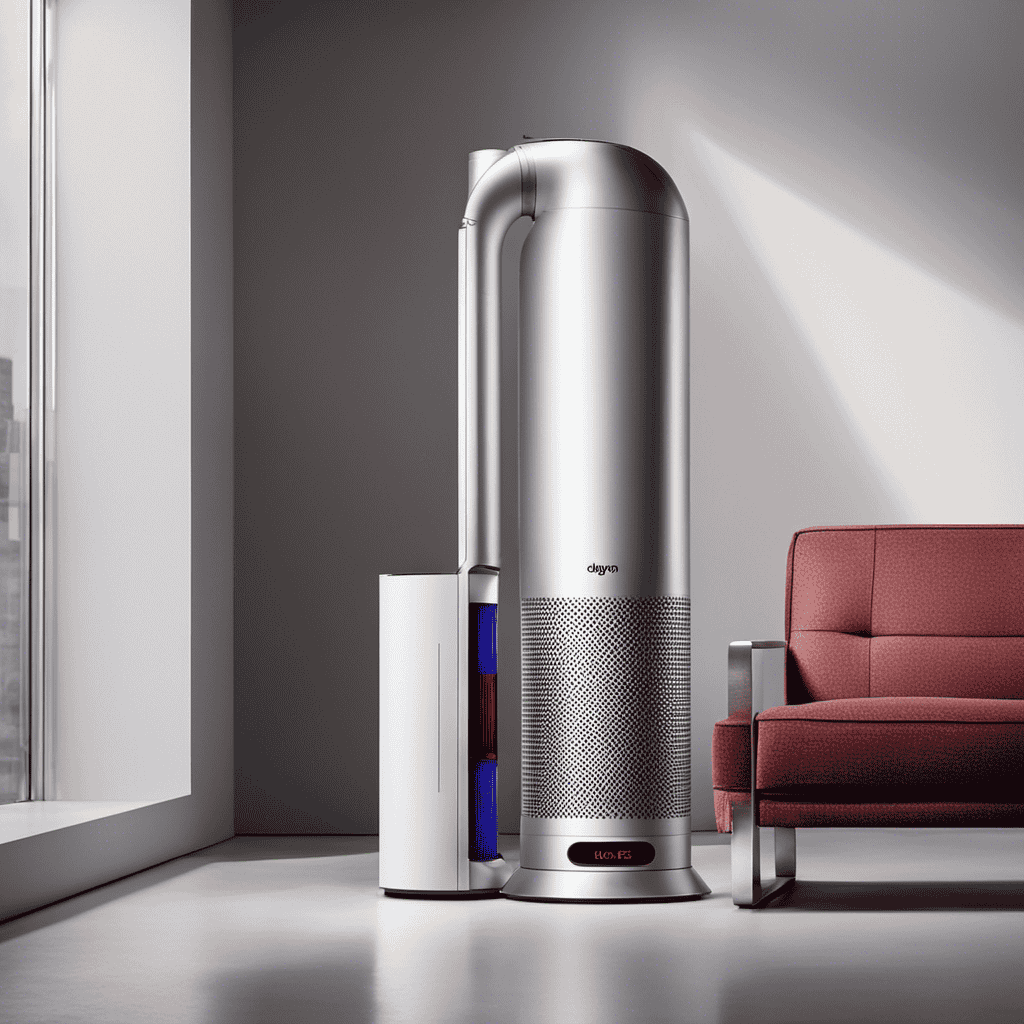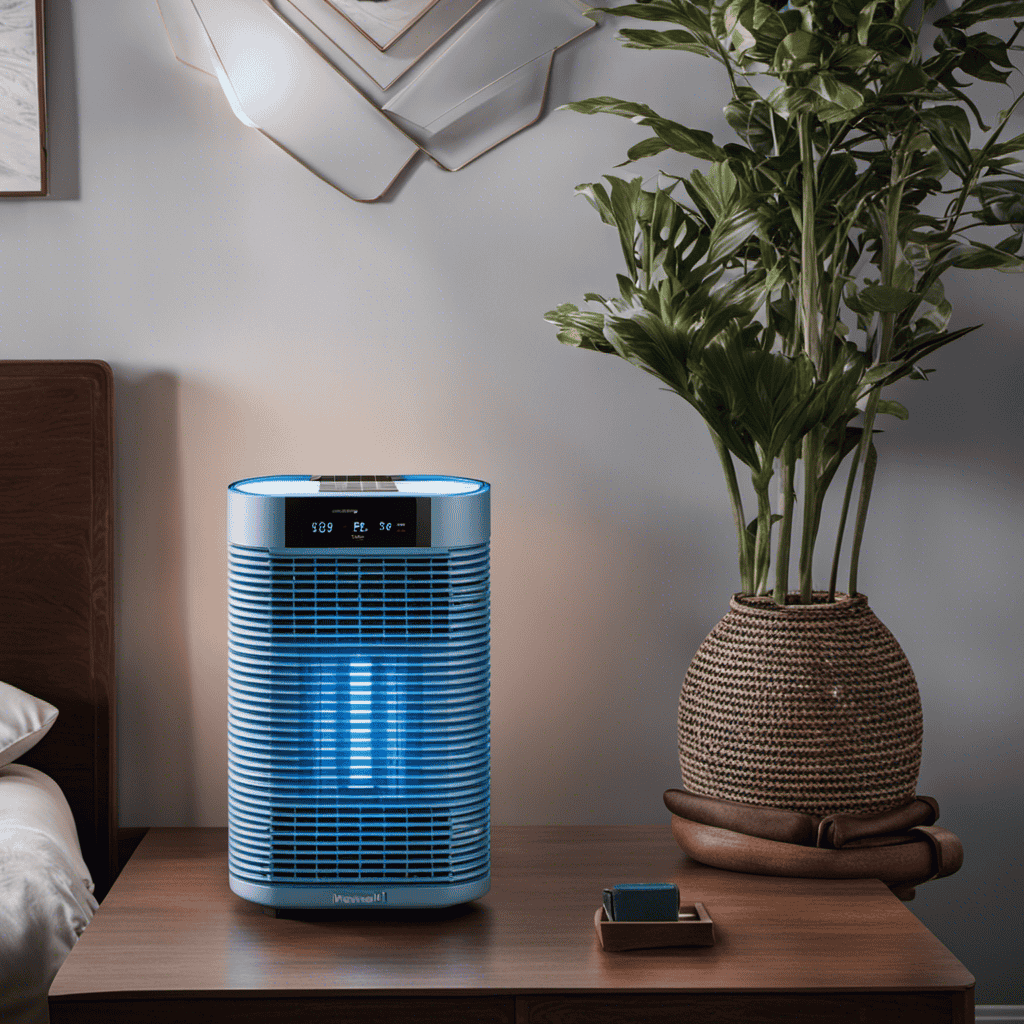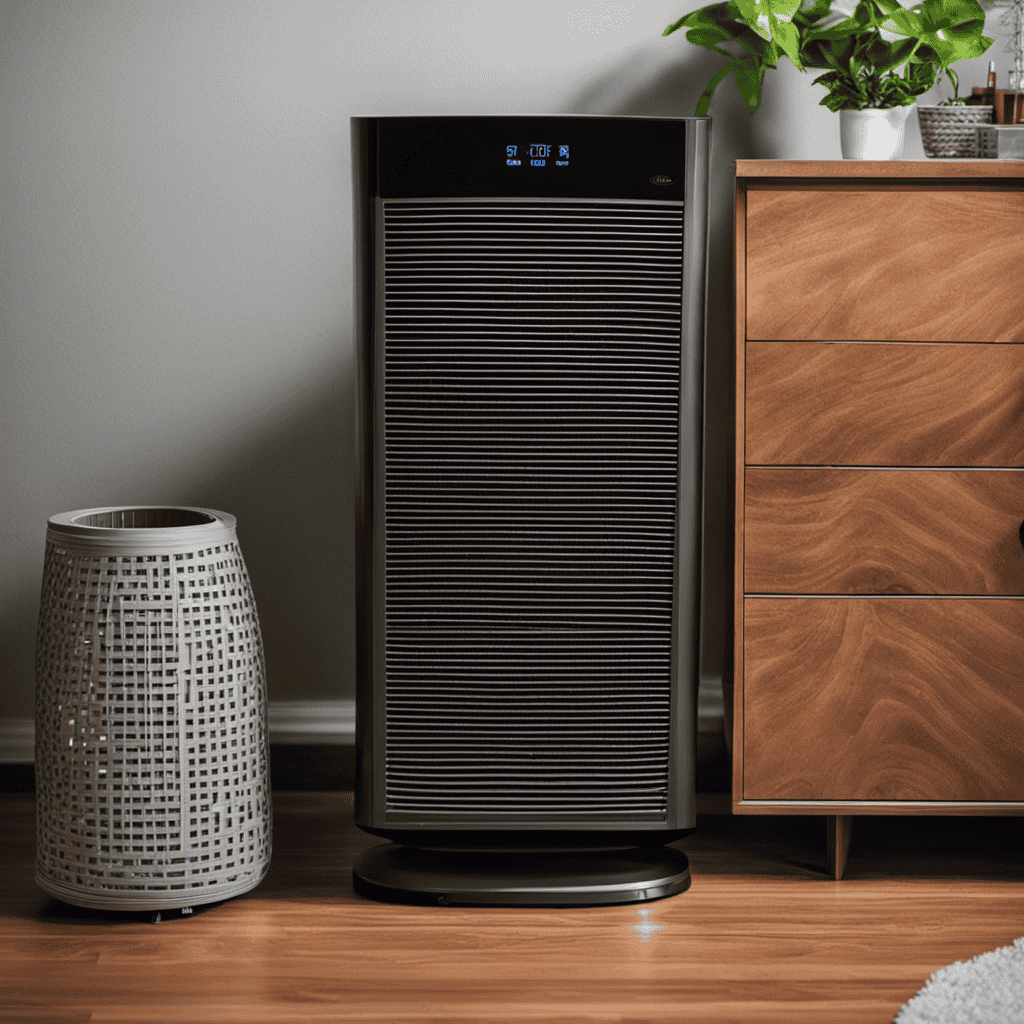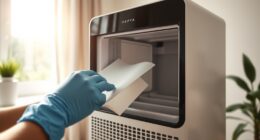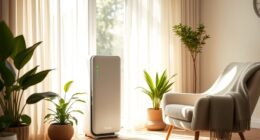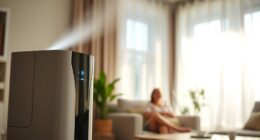As an air purifier enthusiast, I can confidently say that keeping up with filter changes is crucial for maintaining optimal air quality in your home. Regularly replacing filters ensures that your air purifier continues to effectively remove pollutants and allergens from the air.
With so many factors impacting filter lifespan, it’s essential to follow the manufacturer’s recommendations to ensure peak performance. In this article, we will explore how to determine when to change filters, different types of filters and their lifespan, and the common mistakes to avoid during the replacement process.
Let’s dive in!
Key Takeaways
- Regular filter changes maintain optimal air quality in your home.
- Dirty filters can reduce the effectiveness of your air purifier.
- Clean air filters improve indoor air quality, reduce allergy symptoms, and prolong the lifespan of your air purifier.
- The frequency of filter changes depends on factors like filter type and pollutant level.
Understanding the Importance of Regular Filter Changes
You should understand the importance of regularly changing your air purifier filters.
There are several factors that can affect the performance of your filters. One of the main factors is the level of pollutants in your indoor air. If you live in an area with high pollution or have pets, your filters may become dirty more quickly.
Additionally, the size and type of filter you have can also impact its effectiveness. It is important to replace your filters regularly to ensure that they are able to effectively capture and remove harmful particles from the air.
Clean air filters have a number of benefits, including improving indoor air quality, reducing allergy symptoms, and prolonging the lifespan of your air purifier.
Factors Affecting Filter Lifespan
When it comes to the lifespan of air purifier filters, two key factors play a crucial role: environmental conditions and filter maintenance practices.
Environmental conditions such as air pollution levels, the presence of allergens, and the overall air quality can significantly impact how long a filter can effectively function.
Additionally, adhering to proper filter maintenance practices, including regular cleaning and timely replacements, is essential in ensuring the longevity and effectiveness of the filters.
Environmental Conditions and Lifespan
The lifespan of air purifier filters can be affected by environmental conditions. Here are some key factors to consider:
-
Pollutant levels: High levels of pollutants in the air can cause filters to become clogged more quickly, reducing their efficiency and lifespan.
-
Humidity: Excessive humidity can promote the growth of mold and bacteria on filters, reducing their effectiveness and lifespan.
-
Temperature: Extreme temperatures can affect the filter material, causing it to deteriorate and become less efficient over time.
-
Indoor air quality: The overall air quality inside your home or office can impact the lifespan of your air purifier filter. If the air is constantly polluted, the filter will have to work harder and may wear out faster.
-
Ventilation: Proper ventilation helps to circulate clean air and reduce the strain on the air purifier filter, prolonging its lifespan.
Considering these factors, it’s important to be mindful of the environmental conditions in order to maximize the lifespan of your air purifier filter.
Filter Maintenance Practices
To keep your filter running efficiently, regularly cleaning or replacing it is essential. Following a proper filter replacement schedule and implementing the best filter maintenance practices can greatly improve the performance and lifespan of your air purifier.
The frequency at which you should change your filters depends on various factors such as the type of filter, the level of pollutants in your environment, and the manufacturer’s recommendations. Generally, it is advised to replace pre-filters every 3 to 6 months and HEPA filters every 6 to 12 months. However, it is important to check the manufacturer’s guidelines for your specific model.
Additionally, it is crucial to clean or replace filters sooner if you notice a decrease in airflow or if the filters appear visibly dirty. Regularly vacuuming and dusting the exterior of your air purifier can also help maintain optimal performance.
Significance of Manufacturer Recommendations
You should follow the manufacturer’s recommendations for changing the filters on your air purifier. Doing so ensures that your air purifier functions optimally and provides you with clean and healthy air. Here are the benefits of following the manufacturer guidelines:
-
Longevity: Changing filters as recommended by the manufacturer helps prolong the lifespan of your air purifier.
-
Efficiency: Regular filter replacements maintain the efficiency of your air purifier, ensuring it effectively captures and removes pollutants from the air.
-
Air Quality: By adhering to the manufacturer’s recommendations, you ensure that your air purifier is consistently providing you with clean and fresh air.
-
Warranty: Most manufacturers require following their recommendations to maintain warranty coverage.
-
Cost-effectiveness: Regular filter changes prevent clogging and damage to your air purifier, saving you money on repairs or replacements.
How to Determine When to Change Filters
After discussing the significance of manufacturer recommendations for changing air purifier filters, let’s now focus on how to determine when exactly to change these filters.
It is important to keep in mind that the lifespan of air purifier filters can vary depending on factors such as the manufacturer, the model, and the frequency of use. However, there are some common signs that indicate the need for filter replacement.
The first sign is a noticeable decrease in the air purifier’s effectiveness. If you find that the air quality in your space is not improving despite running the purifier, it may be time to change the filter.
Additionally, if you notice an increase in dust or allergens in the air, or if there is a persistent odor, these are also indications that the filter needs to be replaced. Regularly inspecting the filter for visible dirt, debris, or discoloration can also help determine when it is time for replacement.
Different Types of Air Purifier Filters and Their Lifespan
When considering the lifespan of air purifier filters, it’s essential to understand the different types available and how long each type typically lasts.
There are several types of air purifier filters, each with its own unique characteristics and replacement frequency:
-
HEPA Filters: These high-efficiency particulate air filters are the most common type used in air purifiers. They can last anywhere from 6 months to 2 years, depending on usage and air quality.
-
Carbon Filters: These filters are effective at removing odors and gases from the air. They typically need to be replaced every 3-6 months.
-
Pre-Filters: These filters capture larger particles like dust and hair, extending the lifespan of the main filter. They should be replaced every 3-6 months.
-
UV-C Filters: These filters use ultraviolet light to kill germs and bacteria. They don’t require replacement but may need occasional cleaning.
-
Electrostatic Filters: These filters use an electrostatic charge to capture particles. They can be washed and reused, but replacement may be necessary after several washes.
Understanding the different types of air purifier filters and their lifespan can help you determine when it’s time to replace them and ensure that your air purifier continues to provide clean and healthy air.
Tips for Extending the Lifespan of Air Purifier Filters
To extend the lifespan of your air purifier filters, it’s important to regularly clean and maintain them. By taking proper care of your filters, you can prolong their life and maximize their performance. Here are some tips to help you achieve that:
-
Clean or replace pre-filters: Pre-filters capture larger particles, preventing them from clogging the main filter. Cleaning or replacing them regularly will ensure optimal airflow and prolong the life of the main filter.
-
Vacuum the filters: Use a soft brush attachment to gently vacuum the filters, removing dust and debris that can hinder their effectiveness. Be careful not to damage the filters during this process.
-
Follow the manufacturer’s instructions: Each air purifier model may have specific maintenance requirements. Refer to the user manual for detailed instructions on how to clean and maintain your filters.
By following these tips, you can prolong the life of your air purifier filters and maximize their performance, ensuring cleaner and healthier air in your home.
| Maintenance Tips | Frequency |
|---|---|
| Clean or Replace Pre-filters | Every 1-3 months |
| Vacuum the Filters | Every 2-4 weeks |
| Follow Manufacturer’s Instructions | As per manual |
Common Mistakes to Avoid When Changing Filters
Make sure you carefully read the manufacturer’s instructions before replacing your air purifier filters to avoid common mistakes. When it comes to changing filters, there are several factors that can affect their performance.
Here are some common misconceptions about filter changes:
- Not changing filters frequently enough can result in decreased air quality.
- Using filters beyond their recommended lifespan can cause reduced effectiveness.
- Neglecting to clean pre-filters can lead to clogged main filters.
- Installing filters improperly can result in air leakage and reduced efficiency.
- Not keeping track of filter replacement dates can lead to forgotten changes.
Importance of Proper Maintenance for Filter Efficiency
Proper maintenance is essential for ensuring the efficiency of your filter. Regularly replacing your air purifier filter is crucial to maintain clean air in your home. By adhering to a filter replacement schedule, you not only improve the performance of your air purifier, but also reap the benefits of clean air in your living space.
To illustrate the importance of filter maintenance, let’s take a look at the benefits of clean air in the home:
| Benefit | Description |
|---|---|
| Improved health | Clean air reduces the risk of respiratory problems, allergies, and other health issues. |
| Enhanced comfort | Breathing in fresh air promotes relaxation and a sense of well-being. |
| Increased energy | Clean air improves mental focus, productivity, and overall energy levels. |
How to Properly Replace Filters in Your Air Purifier
Regularly replacing the filters in your air purifier is crucial for maintaining its efficiency. Not only does it ensure that the air purifier continues to effectively remove contaminants from the air, but it also helps prolong the lifespan of the device.
Here are some important tips to consider when replacing your air purifier filters:
-
Check the manufacturer’s instructions: Different air purifiers have different filter replacement schedules, so it’s important to follow the guidelines provided by the manufacturer.
-
Use proper disposal methods: When disposing of old filters, make sure to follow proper disposal guidelines to minimize environmental impact.
-
Purchase high-quality replacement filters: Investing in high-quality filters will ensure better air purification and longer-lasting performance.
-
Clean and maintain the air purifier regularly: Regular cleaning and maintenance of the air purifier will help optimize its performance and prevent clogs in the filters.
-
Troubleshooting tips: If you notice a decrease in air purification or strange noises, consult the user manual or contact customer support for troubleshooting tips.
Frequently Asked Questions About Filter Changes on Air Purifiers
Why should you check the manufacturer’s instructions for your specific device when it comes to replacing filters in your air purifier? It’s because different air purifiers have different filter designs and requirements.
The manufacturer’s instructions will provide you with the necessary information on how often you should change the filters and how to do it properly. This is important because factors affecting filter performance can vary, such as the level of air pollution in your area or the presence of pets in your home.
By following the manufacturer’s guidelines, you can ensure that your air purifier is working efficiently to clean the air in your space. Signs of a clogged filter may include reduced airflow, increased noise from the purifier, or a decrease in its overall effectiveness.
Regularly checking and replacing filters as recommended will help maintain the optimal performance of your air purifier.
Frequently Asked Questions
Can I Reuse or Wash the Filters Instead of Replacing Them?
I wouldn’t recommend reusing or washing air purifier filters. While some filters may be labeled as reusable, it’s best to follow manufacturer guidelines for replacement. DIY cleaning methods may not effectively remove pollutants and could reduce filter performance.
What Are the Consequences of Not Changing the Air Purifier Filters Regularly?
Neglecting air purifier filter maintenance can have serious consequences. Regular filter replacements are important to ensure clean and healthy air. Not changing filters can result in decreased air quality, reduced efficiency, and potential health risks.
Are There Any Specific Signs or Indicators That Show It’s Time to Change the Filters?
When to change air purifier filters? Look out for decreased airflow and strange odors. Regular filter maintenance is important for clean air. To prolong lifespan, vacuum regularly and follow manufacturer’s guidelines.
Can Using Higher-Quality Filters Extend Their Lifespan?
Using higher-quality filters can potentially extend their lifespan. Regular filter maintenance is crucial to ensure optimal performance. It is important to follow manufacturer recommendations for filter replacement, even with reusable filters.
Are There Any Filters That Are Compatible With Multiple Air Purifier Brands/Models?
Yes, there are universal filters available for air purifiers that are compatible with multiple brands/models. However, using non-compatible filters can potentially damage the air purifier units, so it’s important to use the correct filters.
Conclusion
In conclusion, it is crucial to keep up with regular filter changes for your air purifier. Neglecting this maintenance task can lead to a decline in air quality and effectiveness. By adhering to the manufacturer’s recommendations and noticing signs that indicate a filter change is needed, you can ensure that your air purifier continues to provide clean and fresh air. Remember, a well-maintained air purifier is like a breath of fresh air in your home.
